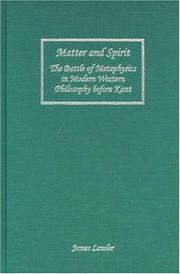| Listing 1 - 2 of 2 |
Sort by
|

ISBN: 0826486827 Year: 2006 Volume: *7 Publisher: London Continuum
Abstract | Keywords | Export | Availability | Bookmark
 Loading...
Loading...Choose an application
- Reference Manager
- EndNote
- RefWorks (Direct export to RefWorks)
For thousands of years philosophers and theologians have grappled with the problem of evil. Traditionally, evil has been seen as a weakness of sorts: the evil person is either ignorant, or weak-willed. But in the most horrifying acts of evil, the perpetrators are resolute, deliberate, and well aware of the pain they are causing. Here David Roberts painstakingly details the matrix of issues that evolved into Kierkegaard's own solution. Kierkegaard's psychological understanding of evil is that it arises out of despair - a despair that can become so vehement and ferocious that it lashes out at ex
Kierkegaard, Søren --- Bien et mal --- Ethics --- Ethiek --- Ethique --- Evil [Problem of ] --- Goed en kwaad --- Good and evil --- Kwaad [Probleem van het ] --- Mal [Problème du ] --- Probleem van het kwaad --- Problem of evil --- Problème du mal --- Good and evil. --- Ethics. --- Kierkegaard, Søren, --- Kierkegaard, Søen. --- Philosophy & Religion --- Philosophy

ISBN: 1580462219 9786611741266 1281741264 158046663X Year: 2006 Publisher: Rochester, NY : University of Rochester Press,
Abstract | Keywords | Export | Availability | Bookmark
 Loading...
Loading...Choose an application
- Reference Manager
- EndNote
- RefWorks (Direct export to RefWorks)
This narrative shows how the contours of moral and political philosophy in the seventeenth and eighteenth centuries were shaped by Kant's two distinct philosophical responses to the results of modern science. This history of early modern Western philosophy takes its inspiration from Kant's claim that the battle between the metaphysics of matter and that of spirit is the principal axis around which modern philosophy up to his time, in all its aspects, has revolved. The empiricist-materialist trend that dominates in England is first examined in the progressively unfolding works of Hobbes, Locke, Berkeley, Hume, and Adam Smith. A contrasting and competing dialectic develops in the rationalist/spiritualist trend in the continental philosophy of Descartes, Leibniz, and Rousseau. Framing this history is the background context of the philosophy and science of Aristotle and the challenges to the traditional paradigm presented by the revolutionary sciences of Copernicus, Galileo, and Newton. James Lawler is Professor of Philosophy at the State University of New York at Buffalo.
metaphysique --- Metaphysique --- 18e s. --- Contribution à la métaphysique --- Et la métaphysique --- Philosophie première --- Cosmologie --- Absence et présence --- Absolu --- Accident (philosophie) --- Acte (métaphysique) --- Agent (philosophie) --- Aléatoire --- Allégorie de la caverne --- Altérité (philosophie) --- Âme --- Analogie (philosophie) --- Anomalie (philosophie) --- Apparence (philosophie) --- Attribut (philosophie) --- Bien (philosophie) --- Catégories (philosophie) --- Causalité --- Changement (philosophie) --- Chose (philosophie) --- Chose en soi --- Cogito --- Compensation (philosophie) --- Complexité (philosophie) --- Contingence --- Continu (philosophie) --- Convenance (philosophie) --- Crise (philosophie) --- Déterminisme (philosophie) --- Dieu --- Différence (philosophie) --- Disposition (philosophie) --- Donation (philosophie) --- Dualisme (philosophie) --- Entités (philosophie) --- Espace (philosophie) --- Esprit --- Esprit et corps --- Essence (philosophie) --- Éternel retour --- Éternité (philosophie) --- Événement (philosophie) --- Existence (philosophie) --- Expression (philosophie) --- Finalité --- Fini (philosophie) --- Forme (philosophie) --- Hasard --- Hylémorphisme --- Hypostase (philosophie) --- Idéalisme (philosophie) --- Idée (philosophie) --- Identité (philosophie) --- Immanence (philosophie) --- Immatérialisme --- Impetus (philosophie) --- Individu (métaphysique) --- Infini --- Intellect (philosophie) --- Limite (philosophie) --- Logos (philosophie) --- Loi (philosophie) --- Matérialisme --- Matière --- Microcosme et macrocosme --- Mode (philosophie) --- Monade (philosophie) --- Monde (philosophie) --- Monisme --- Mouvement (philosophie) --- Multiple (philosophie) --- Naturalisme (philosophie) --- Néant (philosophie) --- Nécessité --- Nihilisme (philosophie) --- Nominalisme --- Norme (philosophie) --- Nouveauté --- Objet (philosophie) --- Occasion (philosophie) --- Ontologie --- Optimisme --- Ordre (philosophie) --- Origine (philosophie) --- Participation (philosophie) --- Perfection --- Pessimisme --- Phénomène (philosophie) --- Pluralisme (philosophie) --- Possibilité --- Principe (philosophie) --- Principe d'économie (philosophie) --- Principe de raison suffisante --- Problème du mal --- Puissance (métaphysique) --- Pureté (philosophie) --- Réalisme (philosophie) --- Réalité --- Réification --- Répétition (philosophie) --- Simplicité (philosophie) --- Situation (philosophie) --- Soi (philosophie) --- Spiritualisme --- Substance (philosophie) --- Sujet (philosophie) --- Système (philosophie) --- Temps (philosophie) --- Théodicée --- Totalité (philosophie) --- Transcendance (philosophie) --- Transcendantaux --- Triade (philosophie) --- Un (philosophie) --- Universaux (philosophie) --- Universel (philosophie) --- Virtualité (philosophie) --- Weltanschauung --- Philosophie --- Aristotle. --- Copernicus. --- Empiricist-Materialist. --- Galileo. --- Kant. --- Metaphysics. --- Newton. --- Rationalist-Spiritualist. --- Western Philosophy.
| Listing 1 - 2 of 2 |
Sort by
|

 Search
Search Feedback
Feedback About UniCat
About UniCat  Help
Help News
News